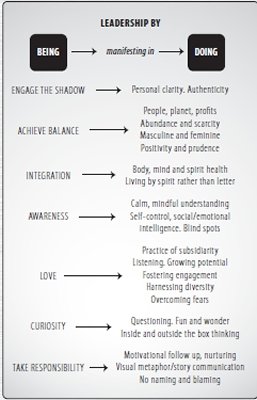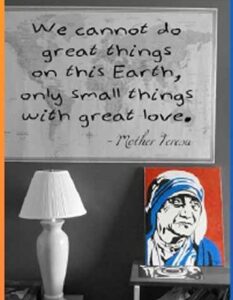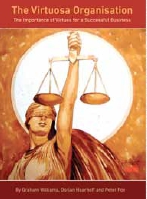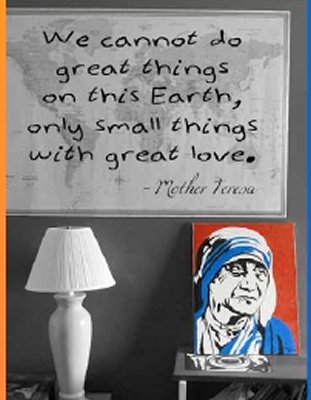
Graham Williams is a certified management consultant and author based in Cape Town, South Africa. With Dorian Haarhoff and Peter Fox, he published “The Virtuosa Organisation”. Broad in scope, yet specific in its application the book examines subjects such as the dark side of leadership, how to embrace People + Planet + Profit thinking, and how to move from vision to values to virtues, deeper mindfulness, and overcoming the ‘taboo’ of love and compassion in the workplace.
Leonardo da Vinci’s virtues form the basis of a different approach to being and doing for organizations. This book is a must-read for any change practitioner, leader or consultant. Though an interview can’t show the full depth of a book, I talked with Graham Williams to get the gist.
MB: Why have you written a book on “the importance of virtues for a successful business”?
GW: “When there is an overwhelming response to the life and death of a Nelson Mandela, a Princess Diana, Mother Teresa, Studdert Kennedy, it is because people are attracted by the magnet of virtue. What they have seen and felt for such a person touches a deep chord: it resonates with what they themselves wish to be. A virtuous person has incredible positive influence. And this is a huge opportunity for business organizations too.
The flip side is that the absence of consistently displayed virtues, or a disconnect between expressed values and actual behaviors spells disaster for an organization’s reputation and long-term sustainability. And there is no quick fix once your reputation is gone.

Take this headline about Barclays Bank: “Barclays chief executive Antony Jenkins says he expects it to be five to ten years before he can restore public trust in the bank”. In a related article, BBC Business Editor Robert Preston said that “A picture was painted of an industry whose instincts is to bend or break the rules when there’s money to be made and no-one’s looking”.
 When trust is broken, externally and internally, this leads often to a stifling and neurotic culture, depressed productivity, and ineffectiveness.”
When trust is broken, externally and internally, this leads often to a stifling and neurotic culture, depressed productivity, and ineffectiveness.”
MB: Though positive leadership and virtuousness is becoming more in vogue, can we expect ordinary businesses to embrace being virtuous?
GW: “More and more businesses are genuinely adopting the triple-bottom-line of People-Planet-Profit. But too many still pay lip service to virtuous behaviors. The selfish chase is still largely about money – without much regard for wider concerns.
The Economist Intelligence Unit has released a report that points to unethical practices in the 80s and 90s in the financial services industry, leading to the current financial crises.2 These practices were characterized by profit-chasing which “led to extreme risk-taking, selling derivative products they did not understand and many clients did not need, and lending to people who could not afford the repayments”. The reported responses from the industry are disquieting, to say the least – they are full of lip service, blind spots, and indifference.
Financial Services leaders talk about ‘strengthened formal codes of conduct’, ‘raising awareness’, ‘introducing incentives’. This is like applying sticking plaster when drastic surgery is needed. Scarily, these top executives struggle to appreciate the benefits of ethical behavior, believing that career advancement would be retarded, and also that their firms would become less competitive! A primary conclusion of the report is that “Ethical conduct might still not be an entirely natural fit with financial services”. Deep-seated cultural impediments seem to be here to stay….

This absence of virtuous behavior goes far beyond financial services, to the mining, petroleum, construction and other industries. There have been reports that Nestlé is using deep underground local water supplies in Pakistan (as they do elsewhere) to produce their mineral-enriched bottled water. And BP that publicly espouses values such as integrity, respect, safety and environmental concern, were charged with no less than 760 safety violations in a 5-year time frame, and were found to be grossly negligent in a number of instances.3 The Gulf of Mexico disaster was inevitable. Governments are not exempt of course. Next week marks the 10-year anniversary of UNCAC, the United Nations Convention Against Corruption, yet little has changed since inception. Even the UN have things to answer for. Consider the gap between their stated value of integrity and their refusal to consider compensation to the thousands who died in the recent cholera outbreak in Haiti. Compelling evidence shows that the most probable source of the cholera outbreak was at one of their peacekeeping missions. Instead, the UN invoked their legal immunity.
 Every day we read of similar behaviors. These are not ‘bad’ organizations. They all have done the vision and values thing, published stuff about compliance, codes of ethics, codes of conduct, corporate social investment endeavors and sustainability reports. Yet the value-disconnects go on for various reasons. Ultimately it comes down to organizations answering not ‘what we should DO’ but rather ‘what should we BE’. It’s about building a virtuous culture. And to quote the writer Dr Seuss: “Unless someone like you cares a whole awful lot, nothing is going to get better. It’s not” (The Lorax)”
Every day we read of similar behaviors. These are not ‘bad’ organizations. They all have done the vision and values thing, published stuff about compliance, codes of ethics, codes of conduct, corporate social investment endeavors and sustainability reports. Yet the value-disconnects go on for various reasons. Ultimately it comes down to organizations answering not ‘what we should DO’ but rather ‘what should we BE’. It’s about building a virtuous culture. And to quote the writer Dr Seuss: “Unless someone like you cares a whole awful lot, nothing is going to get better. It’s not” (The Lorax)”
MB: How do you go about making such a major shift in thinking and practice?
GW: “I think that one of the things to grasp is that being virtuous and being profitable are not mutually exclusive propositions. They are both part of a reinforcing virtuous cycle. Our book offers a tried and trusted map through the corporate jungle. The Virtuosa Organisation includes a full case study, examines subjects such as the dark side of leadership and how a ‘fragmentation of conscience’ can permeate an entire organization. We give examples and a process of how to embrace people + planet + profit action, and escape from a vicious to a virtuous cycle.
Here’s how organizations ‘go on a values to virtues journey’:
1. After becoming aware of the need to change, they start with a clear, renewed, measurable vision in which the values are inherent, and the passion for what you want to be is explicit
2. Identify and state the agreed core organizational values (the guiding principles). Anyone can arrive at a set of values (even criminal gangs have them!) and far too many organizations have landed up with weak, boring, largely meaningless values, often based on what they think the wider public would like to see. We call these ‘threshold values’ (things like integrity, responsibility, accountability) that you should have anyway if you’re in business. The trick is to arrive at the RIGHT values in the right way.
3. Make the values visible and transparent, translate them into behavior indicators, instill them, ensure that staff know how they are to be practiced (embodied). Here is where special skill is needed for success. It’s about a lot more than putting posters on walls!
4. Reinforce the values, attitudes and behaviors resulting from the exercise, using appropriate communication, reward and recognition mechanisms, role-modeling and coaching, mentoring and counseling, behavior and habit modification techniques – including ‘gamification’.
In this way the values become character virtues, embedded in the organization’s culture. Vision to Values to Virtues is not always a linear process – they are deeply connected and intertwined.”
MB: You use a set of Leonardo da Vinci virtues to illustrate how organizations could operate. Why?
GW: “We considered approaches from classical antiquity, religion, ancient traditions, philosophy, psychology, modern societies and business. We considered distinguishing between terminal values (end-state or goal values such as self-esteem, independence) and instrumental values (those that enabling the reaching of the goals, such as courtesy, ambition).
We decided on a set of seven Da Vinci virtues because these values provide a non-threatening, illustrative approach to being and doing in a business.
As an example: one of these is the practice of love, a largely ignored force in the hardnosed corporate world. June Singer, a giant in the world of analytical psychology, says: “In our concerns with counting and weighing and measuring, with precise descriptions and careful evaluation, we sometimes fail to recognize or give credit to values that do not fit these criteria. Or, when we do recognize that such values exist, we split them off from the consciousness of the marketplace and relegate them to the categories of religion or the arts”.
Over 30 practices that go beyond emotional and social intelligence are examined, including attentive listening, anonymous commendations, communication style and letting go.
Fears – fear of disapproval, vulnerability, isolation, criticism, career blocks and a host of others – are present in some workplaces and work against the practice of love, sometimes resulting in dysfunction when people put on their protective armour. So this too is explored in detail.
This is not to say that we are advocating the Da Vinci virtues for universal application. Each organization should arrive at its own right virtues given its own uniqueness, circumstances, and situation.”
MB: What is your personal hope for your book?
GW: “Large challenges face the planet, its resources, and its people. We are living on the edge in a fragile (even broken) world of increasing tensions – political, ecological, religious fundamentalism, social, financial and economic – which all feed off each other, and tend to erode trust and confidence and values. Natural disasters, war, food and water shortages, extreme poverty, protesting communities, jittery markets are all volatile events that can quickly escalate into crises. As can corrupt, deceitful, narrowly focused business practices. And these challenges are inter-linked. “Humankind has not woven the web of life. We are but one thread within it. Whatever we do to the web, we do to ourselves. All things are bound together. All things connect” – Chief Seattle, Duwamish Tribe
Too long business has neglected its full leadership role in building a better society. Business is uniquely poised and equipped to be the difference that is so urgently needed. Savvy, courageous leaders can be the catalyst to introduce virtuous cultures in their organizations and go further than ‘being good and doing good’. In so doing, they will find a deeply satisfying way of doing business and securing the future. They can become role-models for society at large and experience deep intrinsic motivation of becoming connected, finding meaning, and succeeding at making a difference that counts. At work, at home, and in their communities…. Give a dazzling, virtuoso performance!
 It is time to put things right. My hope is that The Virtuosa Organisation resonates with leaders ready to take up the challenge to make the difference that is required.”
It is time to put things right. My hope is that The Virtuosa Organisation resonates with leaders ready to take up the challenge to make the difference that is required.”
The Virtuosa Organization is available from https://www.haloandnoose.com
Marcella Bremer is an author and culture & change consultant. She co-founded this blog and ocai-online.com.

8 Responses
This is a most interesting perspective — with a heartfelt motivation. That said, I believe the opposite is more accurate; that whatever we do to ourselves, we do to the world.
Hi Larry,
A couple approach a therapist for marriage counselling. First the husband shares his version. The therapist nods, “You’re right”. Then the therapist listens to the wife’s version and comments. “You’re right”.
There is a trainee student with the therapist, who asks, “How can you say to both the husband and to the wife, “You are right?”
The therapist turns to the student and says, “You know, you too are right”.
The article is inherently thought provoking. So aptly said, “a disconnect between expressed values and actual behaviors spells disaster for an organization’s reputation and long-term sustainability. And there is no quick fix once your reputation is gone.”
I am completely in tune with your message and one that I try to instill to my clients….changing individual behaviours is the first step towards changing teh collective organisational and societal cultures which leads ultimately to the betterment of the world in which we live.
Sadly though abandonment of financial advancement and capitalism is wrongly regarded as a backward step and associated with the ‘hippy-commune’ lifestyle. Eastern philosophy outlines the benefits of living with as opposed to abusing the environment in which we live.
I agree, Bansi Shah. We can have both financial goals and ethical, virtuous goals. It’s a balance like Yin and Yang that will change the workplace and the world for the better!
Thank you for that wisdom Bansi
Marcella, and Graham; An excellent and helpful interview. For me the core comment was “DO or BE (Being and Becoming).” It is so difficult to be uniquely different, and yet “fit in with companions re normative behaviors- which can be necessary for success and/or effectiveness.” Leadership actions do usually reflect “some (strong?) consensus”, whereas Change may involve more individuality, creative solutions, and new pathways – for better outcomes. Also, thanks for mentioning how “love and integrity” are companion virtues.
Well said Bill.
Perhaps we can connect on LinkedIn?
Graham